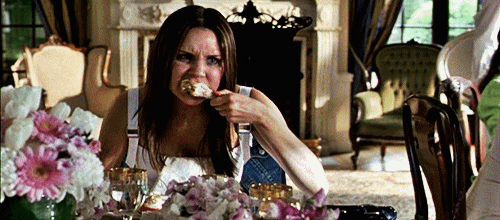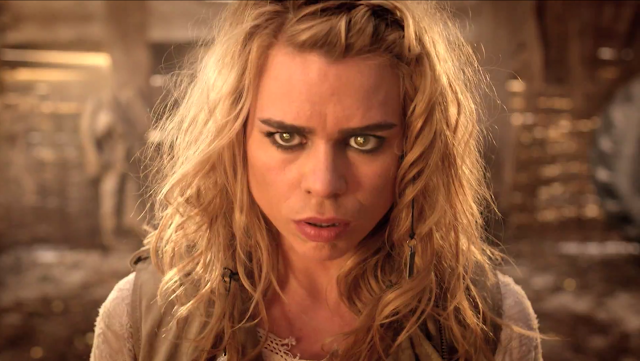It’s kind of hard to believe that the Doctor Who 50th Anniversary Special has now come and
gone. As a latecomer to the party, I’ve still been a fan of the show for a full
third of my life, and even went so far as to write my college thesis on it.
That thesis? Was how I ended up doing this, talking to all of you nice people
about popular culture. So, sometimes it’s hard to stop and think about how much
Doctor Who has impacted my life.
Well, now that that’s out of the way, let’s rip this special
to shreds!
I kid. Somewhat. The Anniversary Special, heretofore to be
referred to as “The Day of the Doctor” was good, fun, very Whovian, and a
pleasant romp through some nice nostalgic bits of Old and New Who. There were guest appearances, lots
of Doctors, and a reference to the running gag with Queen Elizabeth I. All that
is lovely.
But there were things, other things, that weren’t so lovely.
Not that anything in the special was awful or offensive or anything like that,
just that, well, I wanted more. I liked it, but I didn’t love it. I didn’t cry.
And I have it on good authority that I’m not actually dead inside, so it wasn’t
just me. This special didn’t connect to me in the way I really wanted it to.
And I think I know why.
If you’re reading this, I assume you’ve watched “The Day of
the Doctor” and therefore will not be recapping it. But generally, SPOILERS.
There are a lot of parts of the special that I quite liked.
I enjoyed getting to see pieces of Old Who
woven in with the new, and honestly it was refreshing to get to see bits of
Gallifrey again. While I appreciate the decision the show made to separate The
Doctor from his home planet in the new series, I miss the place. It’s a cool
place, and there were always interesting stories to tell there. So, I liked
that we went back.
I thought the premise of the episode, that The Doctor must
make a moral choice about whether the good of the many outweighs the good of
the few, was very timely and emotionally convicting, but I do think that it
stumbled a bit in execution. While I loved all the parts with John Hurt and
Billie Piper snarking at each other and having deep philosophical debates, I
hated all the stuff with the Zygons, which was cheesy, and was utterly bored by
Elizabeth’s inclusion in the plot. Didn’t need her. Just made it more
confusing. Like always.
Actually, while I enjoyed the episode, especially the parts
where John Hurt’s Doctor got to stare into his own future and confront the
reality of his choices, I felt a bit let down emotionally. It was all just
so…Moffat. You know what I mean?
Maybe you don’t. Here’s what I mean: I mean that it was all
flash, and no real substance. It was clever, full of witty lines and silly
moments, with lots of running and zippy dialogue and beautiful women saying
just the right thing at just the right time. It had space art and the
importance of saving children and Billie Piper vamping it up in weirdly
post-apocalyptic sweaters.
But it didn’t make me cry. It didn’t have emotion, real
emotion at its heart.
I’m not entirely sure why this special didn’t emotionally
connect for me. It might be because neither Smith nor Tennant is really “my”
Doctor – I swear fealty to Christopher Eccleston, who wasn’t in this one. Or it
could be because even though we felt a little bit of the chaos on Gallifrey as
the Time War raged we’ve never actually gotten a really good feeling of what
that war was all about, and therefore an entire episode debating the moral intricacies
of a conflict we really know nothing about was kind of weird.
Or it could be that I am sick and tired of hearing about the
damn Time War, and I want us to talk about something else. Because I’m tired of
The Doctor being a “lonely god” or “the only one who can save us now” and I
want him to just be The Doctor again, a weirdo who stole a time machine because
he didn’t want to be a grownup anymore. I miss The Doctor helping people not
because he’s the only one who can, but because he’s in the neighborhood and
it’s the right thing to do.
I miss the everyday courage of Doctor Who. I’ve had my fill of prophecies and universe saving
heroics. I want The Doctor to help a shopgirl see the stars, or try desperately
to get a flight attendant to the airport on time, only to constantly be
hijacked off into time and space. I want The Doctor to do normal things with
normal people and have them be extraordinary for no other reason than that they
might as well be. I’m done with exceptionalism. I want The Doctor to be a man
again.
Again, this could just be me, but I really don’t think it
is. Like I said in the Rose Tyler article, I love characters who are ordinary
people put in extraordinary circumstances. The Doctor’s never going to be
exactly normal, sure, but he can be normal-esque. He doesn’t really have any
special skills, does he? And his preferred weapon is a really useful
screwdriver. He runs from his problems. He’s just like half my ex-boyfriends in
that sense.
What I mean is, I want to be able to relate to The Doctor. I
think we’ve missed that. We’ve gone way too far in the other direction. And
having Clara be the companion, pretty, perfect Clara, certainly doesn’t help.
Because Clara always knows the right thing to say. She’s the
one who opens the door everyone else thinks is locked. She can tell when The
Doctor’s about to make a decision and talk him around about it. She can do
anything. She’s magic.
I mean she’s literally magic. We established that last
season. And have I mentioned how much I hate that? Because I do. I really do.
Can’t we have someone normal on this show for once? Seriously. I am really sick
of everyone having a destiny or an epic journey or some kind of “only _____ in
the universe” deal going on. It’s exhausting.
Speaking of exhausting, it was a bit tiring seeing Matt
Smith and David Tennant enthuse at each other during the show. While both of
them have very different takes on The Doctor, their styles are similar enough
that having both on screen at the same time was hard. It was just so…bouncy.
Flippant. Hair gelled.
Though, seeing the two of them together did give me the
lovely mental image of seeing Christopher Eccleston and Peter Capaldi being The
Doctor at each other, all repressed swearing and angry eyebrows. And that made
me happy.
On the list of things I actually quite liked about the
special, and I know this one is controversial, I personally loved that Rose
wasn’t actually Rose in this. I am aware that this is virtually heresy,
especially since I have established that I love her character, but hear me out.
I didn’t want Moffat to really get his hands on Rose to
begin with, because I don’t trust him, but also because I quite like where Rose
ended up. I mean, think about it. She lives in a parallel reality where her
mother and father are alive, happy, and together. Where she has a baby brother
and a job she loves. Where people ride around in zeppelins. Oh, and she happens
to live with another version of The Doctor, one who can kiss her and love her
and grow old with her.
I really, really didn’t want to see a story where Rose wasn’t
in that happy world anymore. I want her in that world. It’s a good world.
So seeing that Rose wasn’t Rose here, but rather an
Interface taking Rose’s shape was pretty cool. It meant that we got some nice
Billie Piper action, but that it didn’t take over the story. Also cool? The
idea that after The Doctor regenerated into his next form (Eccleston’s Doctor)
he retained some vague memory of a “bad wolf” and a pretty blonde girl. And
then he met Rose.
I do like that it comes full circle there.
And I have to admit that I like that the whole thing about The
Doctor murdering everyone he’d ever known has finally been resolved. That’s a
good thing. Maybe we can get away from the lonely god stuff now. Please, please
let us get away from it.
But here’s my real disappointment with “The Day of the
Doctor”: it wasn’t as good as the story I had in my head. And that’s always a
bummer.
Now, the story in my head, what they could have done, though
not what I actually expected them to do, isn’t particularly filled out, but I
think it stands. I didn’t want to hear about the Time War. I didn’t want to
discover a new, unspoken regeneration. And I really didn’t want to see David
Tennant’s Doctor kissing people to figure out if they’re Zygons or not.
No, I wanted to see The Doctor before he became The Doctor.
I wanted to see what he was running from all those years ago. I wanted to see
the man before.
Imagine that John Hurt wasn’t playing another regeneration
of The Doctor, but rather an earlier age of a regeneration we’d already met. By
that I mean, his first regeneration. That John Hurt was playing The Doctor before
he was The Doctor, back when he went by his real name, when he was friends with
The Master (really friends), and when he lived on Gallifrey. What happened?
What was so wrong that he ran and never stopped running?
What did he do that
made him decide to never ever do any harm again?
That was what I wanted to see. And while I can appreciate that
this episode was very clever and pretty and well done, which it was, it wasn’t what
I actually wanted to know. And none of it touched my heart.
Call me a romantic, but aren’t things like anniversaries
supposed to be about heart? Isn’t something like the fiftieth anniversary
supposed to let you feel the things you’ve always loved about the show, and to
drag your emotions around? I don’t want something clever. I want something
true.
I also want Moffat to not be the showrunner anymore, to be
honest. I think it’s time we had a bit more feeling and a bit less clever.






